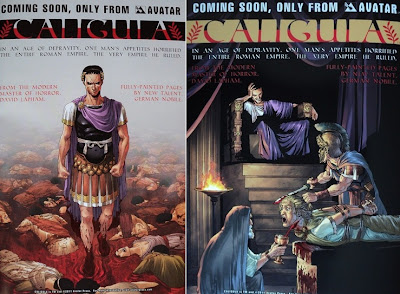 |
In order to kill Caligula, Junius and centurion Laurentius found a weakness in the demonic creature that possessed the ruler of Rome. However, this demon has returned. Only those who were close to Caligula can detect the presence of this evil. And thus, it’s time for a rendezvous between Laurentius and Agrippina, mother of Nero. The woman is concerned about his incestuous relationships with the deceased emperor, and she fears some of that evil seed has been passed onto her son, the young Nero.
 |
| Laurentius and his mutilated wife / Laurentius y su esposa mutilada |
There is also a tête-à-tête between Junius and Laurentius. Junius is no longer the innocent boy that was sodomized by Caligula on a regular basis. Now that he has power enough over a company of gladiators he repeats the same patterns, he does what the emperor did to him.
Power and sex come together. Junius is the one dominating, and his gladiator is the one being dominated. Sex between these two men is not an act of consent but of domination.
Once again, we have German Nobile as the penciler, inker and colorist of the series. And it’s such a joy to look at his pages. From the brutal dismemberment of Laurentius’s wife to the savagery and violence on the Coliseum, from the strong, unapologetic sexual scenes (particularly the sequence in which Agrippina remembers how she was raped by her own brother) to the brilliant design of a new demonic presence in the court of Rome, a man with teeth in the abdomen, a child’s hand instead of a penis, and a sexual organ that comes out of the abdomen. This is the kind of monsters that really impress me, clearly German has put a lot of thought into this. Let’s not forget the darkness and almost palpable dirtiness that we can observe in the scene in which Junius is about to subjugate one of his gladiators. Congratulations to the creative team for another captivating opening chapter.
 |
| Caligula raping his sister Agrippina / Calígula violando a su hermana Agripina |
_________________________________________________________________________________________
 |
| Rome's new demon / el nuevo demonio de Roma |
He hablado antes sobre el sexo y el poder. He explicado que, a veces, los gobernantes también deben estar a cargo de lo que sucede en la alcoba. En la primera miniserie de Calígula, el emperador de Roma era el epítome del poder, expresado en cada faceta posible: política, sexualidad y habilidades sobre-naturales. El escritor David Lapham regresa al Imperio Romano durante la era de Claudio. Calígula ha muerto hace mucho pero su fantasma permanece.
Para matar a Calígula, Junius y el centurión Laurentius encontraron una debilidad en la criatura demoníaca que había poseído al amo de Roma. Sin embargo, este demonio ha regresado. Sólo aquellos que fueron cercanos a Calígula pueden detectar la presencia de este mal. Y así, llega el momento para un encuentro entre Laurentius y Agripina, madre de Nerón. La mujer está preocupada por su relación incestuosa con el fallecido emperador, y teme que algo de esa semilla maligna resida en su hijo, el joven Nerón.
 |
| Junius taking (sexual) advantage of his gladiator / Junius aprovechándose (sexualmente) de su gladiador |
También hay un tête-à-tête entre Junius y Laurentius. Junius ya no es el chico inocente que era sodomizado con frecuencia por Calígula. Ahora que tiene suficiente poder sobre una compañía de gladiadores repite los mismos patrones, hace lo que el emperador le hacía a él.
El poder y el sexo van juntos. Junius es el dominante, y su gladiador es el dominado. El sexo entre estos dos hombres no es un acto de consenso sino de dominación.
Una vez más, tenemos a German Nobile como dibujante a lápiz, entintador y colorista de la miniserie. Y uno disfruta mucho viendo sus páginas. Desde el brutal desmembramiento de la esposa de Laurentius hasta el salvajismo y la violencia del Coliseo, desde las fuertes y explícitas escenas sexuales (en particular, la secuencia en la que Agripina recuerda cómo era violada por su propio hermano) hasta el brillante diseño de una nueva presencia demoníaca en la corte de Roma, un hombre con dientes en el abdomen, una mano de niño en vez de pene, y un órgano sexual que sale del abdomen. Esta es la clase de monstruos que realmente me impresiona, es obvio que German se ha tomado su tiempo para hacer estos diseños. No olvidemos la oscuridad y la suciedad casi palpable que podemos observar en la escena en la que Junius está a punto de subyugar a uno de sus gladiadores. Felicitaciones al equipo creativo por otro cautivador primer capítulo.


































